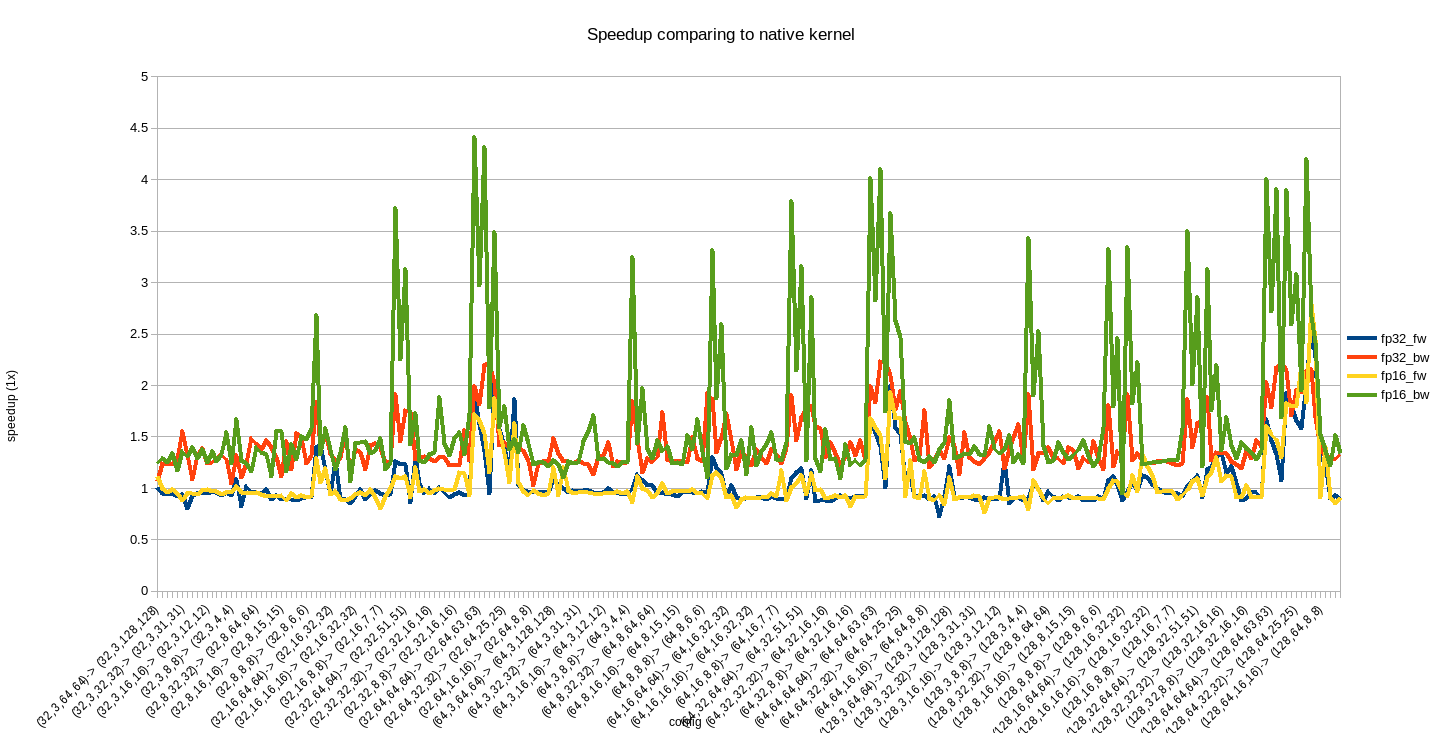-
Notifications
You must be signed in to change notification settings - Fork 25.4k
[nhwc support for adaptive_avg_pool2d & adaptive_avg_pool2d_backward] #24396
New issue
Have a question about this project? Sign up for a free GitHub account to open an issue and contact its maintainers and the community.
By clicking “Sign up for GitHub”, you agree to our terms of service and privacy statement. We’ll occasionally send you account related emails.
Already on GitHub? Sign in to your account
Conversation
Initial kernel support added for optimized NHWC tensor. TODO: currently backwards kernel spits out tensor with NHWC stride. Unfortunately autograd restores grad to contiguous (in either copy or add). This makes real perf tuning annoying to do. (since I cannot easily measure end-to-end time in my python script) My current kernel is blazing fast comparing to the original NCHW kernel in fp16, since I avoided atomicAdd. I'll finish perf tuning after we merged some future PR expanding NHWC support in the core.
|
Supporting #23403 |
|
cc @ifedan |
|
@jjsjann123 Do you have any performance metrics? NCHW vs NHWC |
|
I do not have general speedup showing the perf improvement because of the extra kernel I mentioned in this PR (hence perf tuning will be in a follow up PR, I did run a swipe test and see rough perf improvements so it should be fine) To give a specific point here, for input as [128, 256, 64, 64] and output as [128, 256, 32, 32], here's the kernel time. You can see slight perf improvement for fp32, and 2x on fp16 backward kernel. I haven't spend enough time looking at the forward kernel yet, Will revisit that in the perf tuning PR later. |
|
@ifedan Graph showing the relative speedup comparing to PyTorch native kernel. |
|
Notice that my benchmark was done via hacking: I have to explicitly set |
|
Please rebase, we are getting ready to land it. |
Previous kernel does not stride on Channel dimension, and the kernel uses shared memory to store temporary result (to break data dependency -> code paralellism) Resulted in requesting more resources than what's available. Fixing: added striding on C to reduce shmem usage per CTA.
|
Rebased my code and cherry-picked the patch from #25102 |
There was a problem hiding this comment.
Choose a reason for hiding this comment
The reason will be displayed to describe this comment to others. Learn more.
Trying to look for all call inputs. Also some 'dev' practices switch instead of if got changed.
2. adding test for non-contiguous input tensor;
|
Should have addressed all review comments. Feel free to take another look. |
There was a problem hiding this comment.
Choose a reason for hiding this comment
The reason will be displayed to describe this comment to others. Learn more.
@VitalyFedyunin has imported this pull request. If you are a Facebook employee, you can view this diff on Phabricator.
There was a problem hiding this comment.
Choose a reason for hiding this comment
The reason will be displayed to describe this comment to others. Learn more.
@VitalyFedyunin has imported this pull request. If you are a Facebook employee, you can view this diff on Phabricator.
|
@VitalyFedyunin merged this pull request in e263dd3. |
Summary: Initial kernel support added for optimized NHWC tensor. TODO: currently backwards kernel spits out tensor with NHWC stride. Unfortunately autograd restores grad to contiguous (in either copy or add). This makes real perf tuning annoying to do. (since I cannot easily measure end-to-end time in my python script) My current kernel is blazing fast comparing to the original NCHW kernel in fp16, since I avoided atomicAdd. I'll finish perf tuning after we merged some future PR expanding NHWC support in the core. Pull Request resolved: pytorch/pytorch#24396 Differential Revision: D18115941 Pulled By: VitalyFedyunin fbshipit-source-id: 57b4922b7bf308430ffe1406681f68629baf8834
Summary: Initial kernel support added for optimized NHWC tensor. TODO: currently backwards kernel spits out tensor with NHWC stride. Unfortunately autograd restores grad to contiguous (in either copy or add). This makes real perf tuning annoying to do. (since I cannot easily measure end-to-end time in my python script) My current kernel is blazing fast comparing to the original NCHW kernel in fp16, since I avoided atomicAdd. I'll finish perf tuning after we merged some future PR expanding NHWC support in the core. Pull Request resolved: pytorch#24396 Differential Revision: D18115941 Pulled By: VitalyFedyunin fbshipit-source-id: 57b4922b7bf308430ffe1406681f68629baf8834

Initial kernel support added for optimized NHWC tensor.
TODO: currently backwards kernel spits out tensor with NHWC stride.
Unfortunately autograd restores grad to contiguous (in either copy or add). This
makes real perf tuning annoying to do. (since I cannot easily measure end-to-end
time in my python script)
My current kernel is blazing fast comparing to the original NCHW kernel in fp16,
since I avoided atomicAdd. I'll finish perf tuning after we merged some future
PR expanding NHWC support in the core.